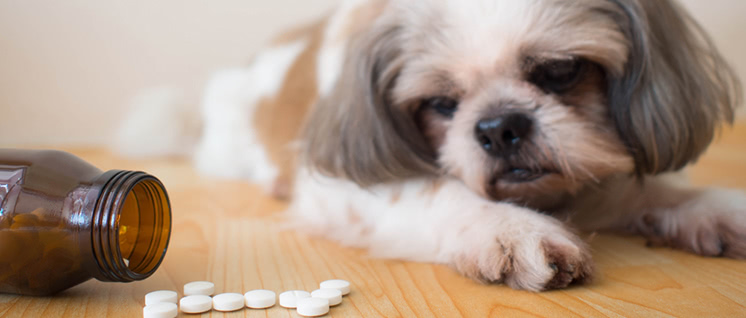Welcome back to our series on Safety Tips for our 4-Legged Furry Friends. Check out some more of our safety tips for hazards that may be lurking in your bathroom and laundry room. From the great outdoors to the kitchen, bedroom and everywhere in between, we ALL want to keep those emergency trips to the Vet at a minimum for Tiger and Fido!
Hazards in the Bathroom and Laundry Room
- Medications that treat human medical conditions can make pets very sick. Never give your pet any medication unless directed by your veterinarian. As a rule, the following medicines should be tightly closed and stored in a secure cabinet above the counter and away from pets: Non-steroidal anti-inflammatory drugs such as aspirin, ibuprofen, naproxen, acetaminophen, diet pills, antihistamines, cold medicines, vitamins and antidepressants.
- Bath and hand soaps, toothpaste and sunblock should also be kept away from your pets. They can cause stomach upset, vomiting or diarrhea.
- Toilet bowl water that has been treated with chemical cleaners can irritate the digestive tract. Therefore, keep toilet lids closed.
- Sinks and tubs filled with water, left unattended, can pose a drowning hazard for small pets.
- Dental floss can be dangerous if eaten or swallowed. Dental floss is made to be extremely strong to withstand hard tugging and pulling when used to floss your teeth. Unfortunately, those same properties make it almost indestructible and it does not dissolve or digest when swallowed. As a matter of fact, dental floss is so strong that it can cause lacerations or strangulation to an animal’s intestinal tract.
- Cleansers, detergents, fabric softeners and bleach are obvious hazards.
- Washers and dryers can be a tempting spot for a nap, especially for cats. Keep the doors on appliances closed at all times!
WHAT TO DO IF YOUR PET IS POISONED?
Don’t wait! Call your Vet or the ASPCA Animal Poison Control Center at 888-426-4435. Time is critical for successfully treating accidental poisoning. Be prepared to state your dog or cat’s breed, age, weight and any symptoms. Have the product container or plant sample nearby to assist with identification so the appropriate treatment recommendations can be made.
We hope you found this post to be helpful, informative and interesting … Thinking of BUYING or SELLING a home in the Spring Hill, Brooksville, Weeki Wachee or the Hernando Beach areas of Hernando County, Florida? If you’re new to the area, be sure to see what Hernando County has to offer you and your family! In the meantime, visit www.GailSellsFloridaHomes.com to explore our state-of-the-art MLS Map Search Feature where BUYERS can SEARCH MLS listings and SELLERS can SEE what their competition is doing!
Until then… it’s all about YOU!


